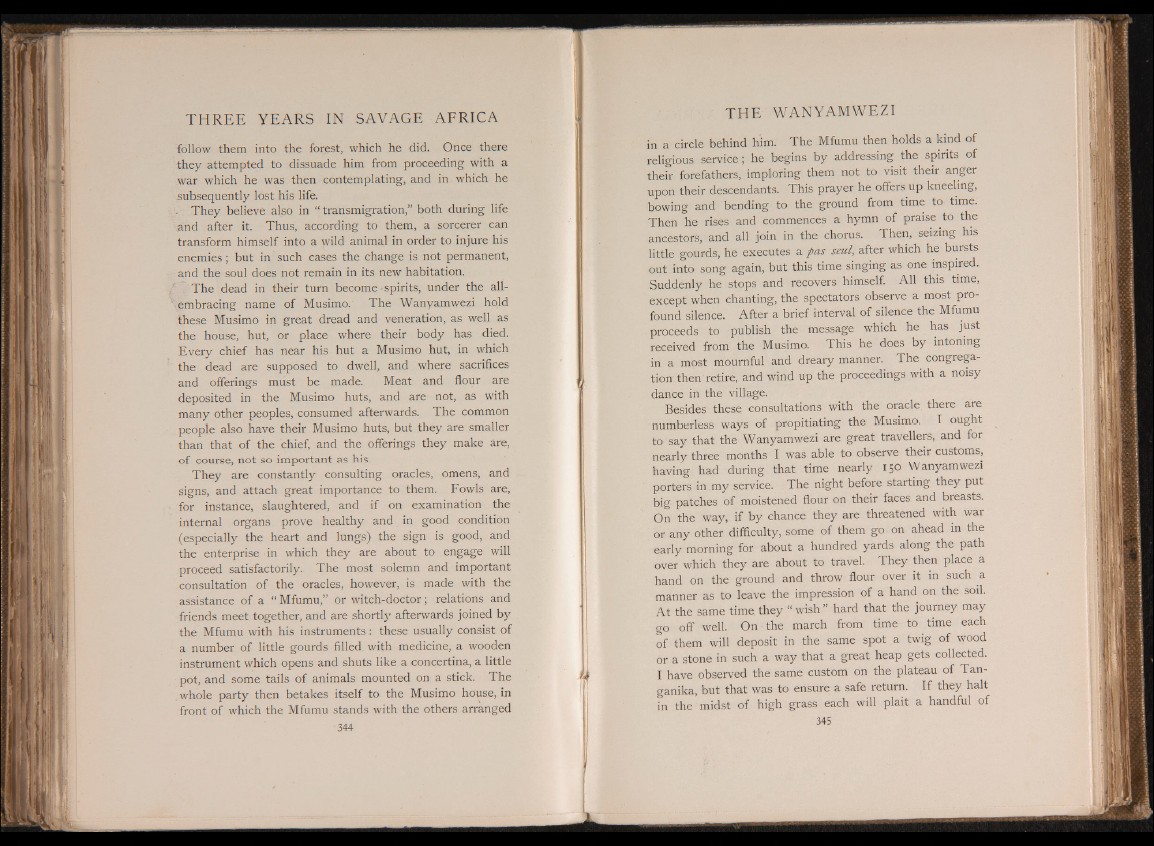
follow them into the forest, which he did. Once there
they attempted to dissuade him from proceeding with a
war which he was then contemplating, and in which he
subsequently lost his life.
They believe also in “ transmigration,” both during life
and after it. Thus, according to them, a sorcerer can
transform himself into a wild animal in order to injure his
enemies; but in such cases the change is not permanent,
and the soul does not remain in its new habitation.
The dead in their turn become-spirits, under the all-
. embracing name of Musimo. The Wanyamwezi hold
these Musimo in great dread and veneration, as well as
the house, hut, or place where their body has died.
Every chief has near his hut a Musimo hut, in which
the dead are supposed to dwell, and where sacrifices
and offerings must be made. Meat and flour are
deposited in the Musimo huts, and are not, as with
many other peoples, consumed afterwards. The common
people also have their Musimo huts, but they are smaller
than that of the chief, and the offerings they make are,
of course, not so important as his.
They are constantly consulting oracles, omens, and
signs, and attach great importance to them. Fowls are,
for instance, slaughtered, and if on examination the
internal organs prove healthy and in good condition
(especially the heart and lungs) the sign is good, and
the enterprise in which they are about to engage will
proceed satisfactorily. The most solemn and important
consultation of the oracles, however, is made with the
assistance of a “ Mfumu,” or witch-doctor; relations and
friends meet together, and are shortly afterwards joined by
the Mfumu with his instruments: these usually consist of
a number of little gourds filled with medicine, a wooden
instrument which opens and shuts like a concertina, a little
pot, and some tails of animals mounted on a stick. The
whole party then betakes itself to the Musimo house, in
front of which the Mfumu stands with the others arranged
344
in a circle behind him. The Mfumu then holds a kind of
religious service; he begins by addressing the spirits of
their forefathers, imploring them not to visit their anger
upon their descendants. This prayer he offers up kneeling,
bowing and bending to the ground from time to time.
Then he rises and commences a hymn of praise to the
ancestors, and all join in the chorus. Then, seizing his
little gourds, he executes a pas seul, after which he bursts
out into song again, but this time singing as one inspired.
Suddenly he stops and recovers himself. All this time,
except when chanting, the spectators observe a most profound
silence. After a brief interval of silence the Mfumu
proceeds to publish the message which he has just
received from the Musimo. This he does by intoning
in a most mournful and dreary manner. The congregation
then retire, and wind up the proceedings with a noisy
dance in the village.
Besides these consultations with the oracle there are
numberless ways of propitiating the Musimo. I ought
to say that the Wanyamwezi are great travellers, and for
nearly three months I was able to observe their customs,
having had during that time nearly 150 Wanyamwezi
porters in my service. The night before starting they put
big patches of moistened flour on their faces and breasts.
On the way, if by chance they are threatened with war
or any other difficulty, some of them go on ahead in the
early morning for about a hundred yards along the path
over which they are about to travel. They then place a
hand on the ground and throw flour over it in such a
manner as to leave the impression of a hand on the soil.
At the same time, they “ wish ” hard that the journey may
go off well. On the march from time to time each
of them will deposit in the same spot a twig of wood
or a stone in such a way that a great heap gets collected.
I have observed the same custom on the plateau of Tan-
ganika, but that was to ensure a safe return. If they halt
in the midst of high grass each will plait a handful of
345